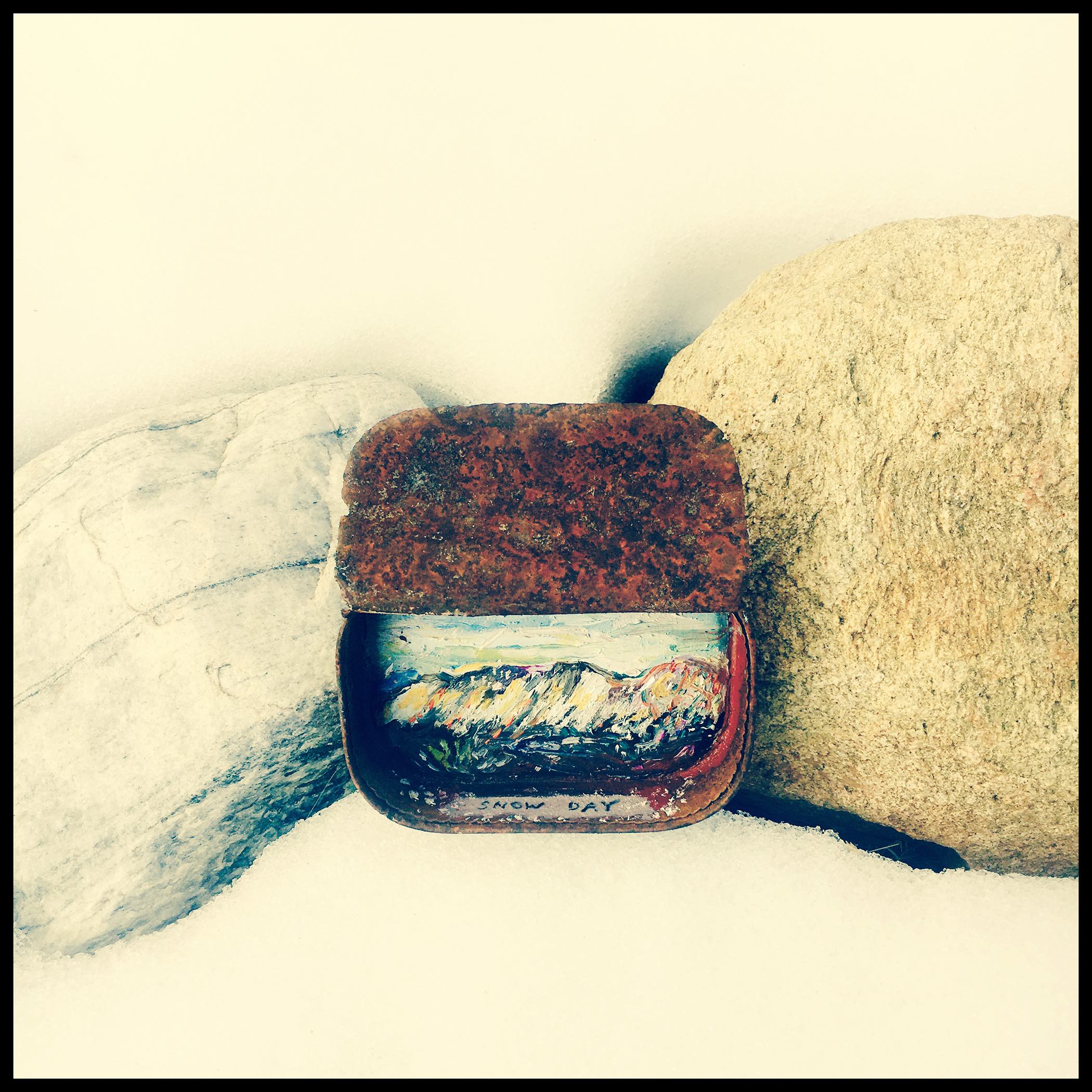The Lumena Center didn’t do much for me ever, and on a Friday night especially, with all of its fluorescent lights illuminating the worst in the shoppers and supplement poppers and gamers and everyone moving within. Samsun was a habitué of the Center’s VR cage, where guys, mostly, would play games wearing headsets, each assigned to a different padded cubicle. This abutted a literal cage where people gamed together and one of the challenges was not running into one another. In the last cage, people threw axes at life-size outlines of bodies projected onto a wall. This was justified as physical exercise, somehow, that helped sublimate aggressive tendencies or something like that. Samsun came here most Fridays, Celia had said. And we had vowed to help Celia avenge her sadness and what had become our mutual anger at his postfuck weirdness.
The Center had dispensaries at both ends with moving walkways spanning the distance between them. Between, there were kiosks for magnetic resonance and mental reset techniques and sign-ups for electrostimulation rooms. There were dosing hubs and recharge stations. People came on Friday evenings after school, after the factory’s second shift, though I never understood why so many people were drawn to come here at the same time, as if being in a crowd were an experience they desired.
I met Celia and Azzie on one end of the second-floor walkway. When together we became a we in a way that made us stronger, bolder, a blur. Celia had done her hair up in braids that circled her head. She wore plastic fangs and a billowy see-through dress. She wore all black and a fanny pack. She had this new hand tremor too. When I asked her about it she laughed, said the EMPTEZ had only made her cranky and shook her, literally. She’d been clawing walls ever since.
Azzie wore a bomber jacket and combat boots. I went for a more discreet, undercover look: black turtleneck and pants, augmented clear plastic framed glasses that could record my path of vision. Celia passed her antler around and we each took turns sniffing its Insta_Pleasure and licking our fingers for luck.
I queued the TrackHer®. It said Samsun was moving dynamically through the VR cage. We split up, turned our cameras to record, and took separate paths toward his location. I went zigzag between the walkways, checking the others’ locations frequently. Celia moved more fluidly from side to side almost as if in doing so she were delaying the inevitable encounter. Azzie beelined and found Samsun first. He was checking into the ax throwing side, waiting on gear. He stood captivated by his device and unaware of her encroachment, Azzie said.
“Oh wait, eye contact made,” she noted. I couldn’t see the feed of what was happening, but I heard his mumble of a greeting and Azzie starting to rant: “Don’t hi me like we’re friends. You’re too busy throwing axes to respond to texts?” I paused to look at Celia’s stream. It looked like she was detouring.
This wasn’t how we’d planned it, but I knew of no other way forward so I carried on. Azzie and Samsun were in a stalemate. Behind them was a desk and a behind that a man holding an axe. I saw Samsun’s confused face and Azzie up in it, looking like she was about to bite his head off.
“You know, it’s pretty shitty that you won’t return Celia’s messages,” I told Samsun.
He was like, “Chill guys, you definitely need to Re-set.”
Azzie started in again, “Don’t ‘guy’ me. You fuck with Celia, you fuck with us.” She threw her chest up against his and stared him down.
He took two steps back, threw up his arms, and was like, “What the fuck!?” And walked off.
I grabbed Azzie and pulled her back. She panted at me, that she was just about to launch into him. I told her she was lucky I’d stepped in as I gazed at the guys in the cage just beyond us, wandering blindly in a realm that made sense only to them. They had headsets covering their eyes, devices in hand, cords tethering them to the mainframe like umbilical cords.
“Abort, abort,” I shouted into my device. Where was Celia? She’d turned off her camera though she still had audio on. “Celia. Meet us in the second-floor women’s bathroom.”
We took a moment and headed across the way, and entered the powder room, where we sat on the floor.
“Azzie, I wouldn’t call that subtle…”
“You didn’t see the look he gave me.”
“You deviated.”
“You think she’s pissed?”
“I mean, she’s not responding.” I messaged Celia again: “Where are u? Not showing on the device. Come, come. A. says she’s sorry. “
We decided to get on with the part deux. Next step was to hack into the local LED signage network and transmit Samsun’s Ihaznodick.gif across it. It wasn’t even a dick shot, just a series of images of him dressed head to foot in black, his slinky body fading into the dark corner, with a bright light above washing his sad, sad face. It made him look isolated. There might have been a tear in his eye.
“She can always say she wasn’t involved or some shit.”
“You think?”
“I was just trying to empower her.”
“You could’ve let her lead, you know? Let her slap his face, pull his hair, have a physical confrontation.” I sensed Azzie was really the one who’d wanted this. It was the male chimp who would show aggression, not the female, not the bonobo. Azzie had some real dick-related anger of late. Like she wanted to be the dominant male. I couldn’t help but think of her father, still missing after so many years and the weight that had on her. She wouldn’t talk about him, ever. I knew from Judy that he just got in his truck one day and never showed up to pick up his haul, never returned to Lumena Hills. His truck was found abandoned at a rest stop. No trace of him. No sign of foul play. Azzie changed the subject if it ever came up. But perhaps if we regressed, she’d be able to claim some form of dominance and heal.
People came and went as we sat there in the powder room attempting to hack into the local network. We moved to two plush chairs with a table between, its smooth self-cleaning surface used for cutting powders, organizing doses. Some girls lingered, but most came and went, passing the mirror, pulling hair, licking teeth, applying rouge, sniffing vials, taking cases from their purses and placing pills in their cheeks.
The fluorescent lights made my head scream.
No word still from Celia. My attempt to hack the network wasn’t working.
Azzie said to let her try. I handed my device to her.
I queued Celia’s camera feed. She’d turned it back on. It was static. All I saw were series of induction pots hanging.
“Something’s wrong,” I told Azzie. “Looks like she’s in kitchenware.”
“Sure, yeah this isn’t working. Let’s go find her.” Azzie dug her hand into her pack and pulled out a tiny plastic banana and split it in half. She tapped out a palmful of pink tablets, swallowed one, held her palm to me. “Edge Eraser?” she offered.
I took one too and then we left. We walked through a side door into the store showroom, past a series of screens and speakers and signal amplifiers, accessories like earpieces, headsets, glasses, helmets. We followed a maze to and through women’s samples — formal dresses with elaborate brocades, others cut in modern shapes, boxlike and awful. Like, who would even wear these? We went on to lingerie, panties, and peek-a-boo nighties, we pushed through silks, pulled them through our fingers and held them to our faces, then headed to kitchenware.
I looked again at the camera stream and Celia’s display. I saw two sets of legs, one from the feet up, and the other squatting, with knees pointed at the camera.
In front of us, there were two guards, one standing over a counter and the other crouching under. I saw Celia’s phone on the floor.
I asked the standing guard if he’d seen Celia. I described her black hair and blonde roots, her black billowy dress.
“Fangs?” he said.
“Yes.”
He nodded and pointed toward the display of knives. They were shiny and sharp and strapped down. The other guard pointed to the door. “She went that way.” He said he’d walked up as she was attempting to break a knife from the case. She had dropped the knife and run away.
“You just let her run?”
“Look, I tried to see if she was okay.”
I grabbed Celia’s phone from the floor and we took off, dodging perfume bots attempting sprays. The sky outside was dark with clouds and rain was pouring over the line of vehicles exiting
We decided to split up and canvass the parking lot.
“No flaking,” Azzie said.
“Yeah, no kidding.”
I walked past the loading docks on the backside. On the other side, I saw a tiny woman standing by the side entrance. With her tiny fingers she held a tiny kerchief over her head. She looked observant and very wet.
I asked if she’d maybe seen Celia: “Blonde braids, black dress, perhaps a bit discombobulated?”
She seemed to have trouble with her words. Her phrases came in spurts: “A particular…? I cannot tell…. Honestly … you look, nice girl …”
She was no help. I walked back toward the loading dock.
In the distance, I thought I made out Celia’s outline walking in the lot. She looked lost. Her hair was soaked. She was walking along a row of parked cars back toward the Center, toward me.
She tripped and stumbled and all of a sudden her body launched into the air, she flew forward, and into the path of a sports utility vehicle.
The sports utility vehicle halted and I started running. I watched Celia fall so slowly–her shoulder hit its grill and then she crumpled, it seemed, into a heap the ground. I ran over to her side and kneeled beside her. The sports utility vehicle’s lights made her look ghastly, her billow wilted, her pale skin damp. She looked like she was crying but it might’ve been the rain on her face.
“What’s going on Cici? Tell me you’re okay…?”
This didn’t seem to register. She had a cut on her chin and her braids had fallen though that looked like the extent of her injuries.
The SUV driver was still in her car. Her shocked O of a mouth made her look like she was hyperventilating, with two screaming kids beside her. Finally she popped her door and ran over, and was like, “Are you trying to give me a heart attack or what?”
“Lady, look, I think she’s hurt.”
She was no help. She just freaked. “Oh god it’s not my fault. She hit us. We had no velocity and now just look at her.” She took a capsule from her pocket and put it under her tongue. I had no time for her hysterics, to wait for it to kick in. I grabbed Celia’s hand and tried to help her up but she was dead weight. The cars were lining up. I sent a location pin to Azzie and told her to get out here and quick.
“I’m calling an ambulance,” the SUV driver said.
“No, no don’t do that…” I turned to Celia, wanting her to agree, but she lay there, her eyes wide and without expression.
The woman was already talking to someone on her device. The children in the SUV started pressing their faces into the windshield, putting their mouths on the glass, and then turning the headlights on and off. The woman said paramedics were on their way, then went back to sedate her little monsters, or so I hoped. They were acting like little cretins whose behavior was so beyond. Judy would’ve had a field day with them.
Azzie came running just as the ambulance pulled up. She and I stood to the side as the EMTs asked Celia a long list of questions. They asked her to hold up one finger for yes, two for no. She could do this. They pressed their gloved hands over her body. I wondered what shape it would’ve made if they’d been wearing my gloves. They pulled her dress down to rub her chest. They needled and masked her and then lifted her onto a stretcher.
Azzie asked “What’s going on?”
The tall one said, “I can’t conjecture. Nothing apparent. No contusions, no lacerations, no pupil dilation.” They needed to run tests. She said it was standard procedure and lifted the back end of the stretcher into the ambulance. I attempted to climb in after them but she blocked me.
“Uh-uh! You can’t ride.”
“Just me?” I pleaded.
“No minors,” she barked. But she seemed to take pity. “Sorry, not my rules. We’re taking her to the Downtown Hospital. You can check on her there. Her guardians have been alerted.”
The ambulance drove off, its lights rotating, the sound blaring, and the traffic again started moving. Azzie and I stood there watching, the rain running down our faces.
We walked back into the warm and dry of the Lumena Center feeling defeated. It was emptier near closing time, and we stood in the glare of its lights. I suggested we get a ride to the ER — though Azzie said it was pointless. They wouldn’t let us in without Celia’s mother’s permission. And besides, it takes so long for them to do anything there. She said Celia would be placed in a tiny room where she’d be poked and needled even more, and there’d be just enough room in that room for Celia and her mother. “I’ll call my mom,” she offered. “Ask her to keep an eye out for Celia, you know, keep us posted on what’s going on.”
The Med Rx dispensary’s counter was still packed. Its walls were so clean and bright, and between those walls were so many bodies. The bodies on the other side of the counter wore form-fitting suits and swept pills across plates with long, blunt knives. They used scales to measure powders, tapped powders into capsules. They mixed herbs and emollients with long butter knives.
The line was so long for made-to-order so we made a beeline for the machine. We tapped the screen for the round orange balls, SunKisses. Two grams of Insta_Pleasure, a focus enhancer, and a purple pellet relaxant.
We took the Delixir, too. What was left. Two tablets. It was enough for the night.


